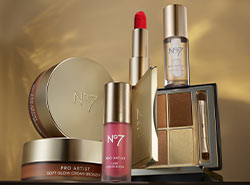Help keep your skin in the clear
We all get the odd spot from time to time, but what’s the difference between the occasional breakout and acne? And what’s the difference between adult acne and teenage acne? Do you treat them differently, or the same way? If you find yourself in a spot of bother, we’re here to help get things clear…
What’s the difference between adult & teen skin?
Your skin behaves differently at different points in your life. As a teenager your skin renews itself more regularly which means it can recover more quickly from breakouts, but at the same time puberty and hormones can wreak havoc. As you get older cell renewal slows down, meaning acne marks can take longer to clear up.
What is acne & how do I know if I have it?
While it’s usually associated with teenage skin, adults can get acne too. In fact, many people of all ages live with acne.
Acne occurs most commonly on the face, cheeks, chin, neck, shoulders, chest and back. If you have mild acne you might have a few pesky blackheads, whiteheads and pimples. Moderate acne includes bigger, more inflamed spots (ouch) and you’re likely to have more than just a few. If you have acne there are things you can do to help clear your skin, regardless of whether it’s teen acne or adult acne (more on that in a mo). It’s also a good idea to speak to your pharmacist if your acne is becoming a bugbear. If you have large, painful spots or cysts you may have severe acne and you should speak to your GP for advice.
What causes teen acne?
While it can be hereditary, the main cause of teen acne is excess sebum, thanks to hormonal changes during puberty. These hormonal changes can make skin oilier, which in turn can block pores and cause acne.
What causes adult acne?
Adult acne can also be hereditary, but can be caused or made worse by everyday things like stress, lifestyle, hormonal changes and pollution too.
Many women and people who menstruate experience hormonal acne as part of their monthly cycle. This acne normally appears on the lower half of the face, near the mouth and chin.
How to treat adult & teen acne
Your GP or pharmacist can talk you through your acne treatment options, and the following self-care tips will help keep your skin looking and feeling as healthy as possible. You may also be able to access acne treatment through our Boots Online Doctor Acne Treatment service.* After completing an online consultation, a clinician will review your answers and provide advice and prescribe treatment if appropriate.
Whatever your age, drinking plenty of water and enjoying a healthy, balanced diet will do wonders for your skin. Investing in some good skincare habits like getting to grips with your skincare routine and cleansing the day away before you hit the hay (trust us, it’s worth the extra few minutes) will also pay off.
If you have teen acne, now’s an ideal time to enlist a decent skincare routine and start really paying attention to your skin, making oil control your main focus. A skincare regime including products suitable for people who may be prone to acne will help cleanse skin, unclog pores and shift spot-loving bacteria.
Look out for ranges that are specifically designed for oily skin to help unclog pores and keep skin squeaky-clean. If you’re on a budget, we love the Tea Tree & Witch Hazel range which has cleansers, scrubs, moisturisers, masks and more to help keep excess oil under control and help keep skin clear. Cetaphil and La Roche-Posay have great options for anyone with more sensitive skin.
If you have adult acne, there are some simple lifestyle changes you can make to help keep your skin clear and healthy. It sounds obvious, but eating well, drinking plenty of water and keeping stress levels low could all help keep breakouts at bay. Exercise is a great way to improve your stress levels, just make sure you shower as soon as possible afterwards to avoid sweat making your acne worse.
If you need a little helping hand, try Neutrogena Visibly Clear Light Therapy Targeted Acne Spot Treatment, which can help treat spots fast. Avoid using products that can dry out your skin, and, no matter how tempting it is, never skip your moisturiser. If you’re using an acne treatment that’s making your skin feel a little dry, choose a moisturiser that’s oil-free and non-comedogenic, meaning it’ll moisturise without blocking your pores.
Don’t touch!
Regardless of whether you have adult or teen acne, the most important thing to remember is that you should never pick or squeeze your spots. We know it’s tempting, but if you start picking and poking you’ll run the risk of spreading bacteria and leaving scars.
And there you have it: your acne questions, all cleared up.








